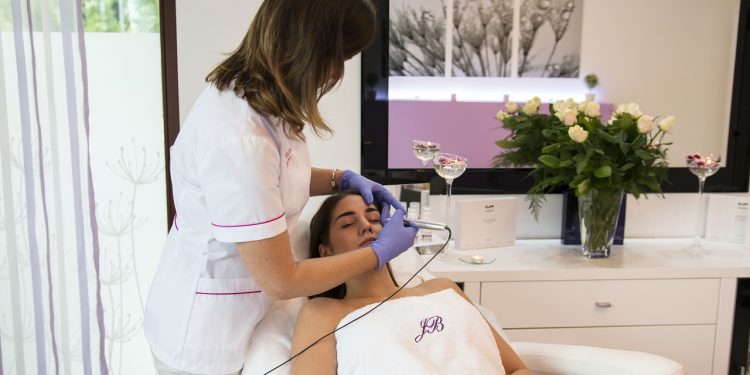When it comes to skincare, there’s no shortage of advice—some good, some not so much. Unfortunately, misinformation about skincare has been circulating for years, often leading people to make decisions that do more harm than good. In this article, we’re going to debunk some of the most common skincare myths that you should stop believing, so you can build a routine that actually works and leads you towards healthy, glowing skin.
1. Myth: Oily Skin Doesn’t Need Moisturizer
One of the most common skincare myths is that people with oily skin don’t need to moisturize. The idea is that adding moisturizer would make oily skin even oilier, but this couldn’t be further from the truth. Skipping moisturizer can actually make oily skin worse. When your skin becomes dehydrated, it compensates by producing even more sebum, which leads to clogged pores and more breakouts.
Instead, opt for a lightweight, oil-free, non-comedogenic moisturizer. Ingredients like hyaluronic acid are perfect for oily skin, as they provide hydration without adding excess oil. Properly hydrated skin helps balance sebum production, leading to less overall oiliness and fewer breakouts.
2. Myth: You Need to Wash Your Face Multiple Times a Day
The belief that washing your face several times a day will help keep your skin clean and prevent breakouts is a myth that can do more harm than good. Over-washing your face strips the skin of its natural oils, leading to irritation and dryness. In response, the skin may produce more oil to compensate, creating a cycle of excess oil production and potential breakouts.
It’s best to stick to washing your face twice a day—once in the morning and once at night. Use a gentle, sulfate-free cleanser that removes dirt and oil without stripping your skin of its protective barrier. Over-cleansing does not equate to cleaner or healthier skin; in fact, it can lead to more issues.
3. Myth: Natural Ingredients Are Always Better
While many natural ingredients can be beneficial for the skin, it’s not accurate to say that natural is always better. There are plenty of synthetic ingredients that are safe, effective, and thoroughly tested. On the flip side, some natural ingredients can be irritating, especially for sensitive skin. For example, lemon juice is often touted as a natural skin lightener, but its high acidity can damage the skin barrier and lead to irritation and sensitivity.
A balanced approach is key—choose ingredients that are proven to work for your specific skin concerns, regardless of whether they are natural or synthetic. Products with synthetic ingredients like niacinamide or peptides can be just as beneficial as those containing natural ingredients like green tea or chamomile.
4. Myth: You Don’t Need Sunscreen on Cloudy Days
One of the most dangerous skincare myths is that sunscreen isn’t necessary on cloudy days or when you’re indoors. UV radiation can penetrate through clouds and even windows, meaning your skin is still at risk for sun damage regardless of the weather or your location. UV exposure is one of the primary causes of premature aging, hyperpigmentation, and skin cancer.
Make sunscreen a non-negotiable part of your daily routine. Opt for a broad-spectrum sunscreen with at least SPF 30, and reapply throughout the day if you are spending extended time outdoors. Protecting your skin from UV rays is crucial for maintaining healthy, youthful skin in the long run.
5. Myth: Expensive Skincare Products Are Always Better
Many people assume that if a product is expensive, it must be better. However, the price tag of a product isn’t necessarily indicative of its effectiveness. There are plenty of affordable skincare products that contain high-quality, effective ingredients. What really matters is the formulation, the concentration of active ingredients, and whether or not a product suits your skin type and concerns.
Look for products with proven ingredients like retinol, vitamin C, niacinamide, and hyaluronic acid. Research and read reviews to find affordable alternatives that deliver the same results as luxury products. Expensive packaging and marketing campaigns don’t always equate to better skincare outcomes.
6. Myth: Pores Can Open and Close
Pores are a permanent part of your skin’s structure, and the idea that they can “open” and “close” is a common misconception. Pores do not have muscles, so they can’t physically change in size on their own. When pores appear larger, it’s often because they are clogged with dirt, oil, or dead skin cells.
While you can’t open or close your pores, you can minimize their appearance by keeping them clean. Use gentle exfoliants, such as salicylic acid, to help clear out impurities and excess sebum. Regular exfoliation helps make pores appear smaller by keeping them free of buildup, leading to a smoother complexion.
7. Myth: You Should Pop Pimples to Make Them Go Away Faster
It can be tempting to pop a pimple, especially when it’s visibly swollen or painful. However, popping pimples can do more harm than good. Squeezing a pimple can push bacteria deeper into the skin, leading to more inflammation, a longer healing process, and even scarring.
Instead, use a spot treatment containing benzoyl peroxide or salicylic acid to reduce inflammation and speed up healing. Pimple patches, which contain hydrocolloid, are also a good option as they help absorb fluid and protect the area from bacteria. Allow your skin to heal naturally to avoid further complications.
8. Myth: Scrubbing Your Skin Harder Leads to Cleaner Skin
Many people believe that scrubbing their skin with a washcloth or exfoliant will make it cleaner, but harsh scrubbing can actually damage your skin barrier and cause irritation. Over-exfoliating or using abrasive tools can lead to redness, sensitivity, and even micro-tears in the skin.
Instead, be gentle with your skin. Use a soft cloth or your hands to cleanse, and choose chemical exfoliants, like alpha hydroxy acids (AHAs), to gently remove dead skin cells without damaging your skin. Remember that a gentle approach is often more effective when it comes to skincare.
9. Myth: Acne Only Affects Teenagers
Acne is often associated with adolescence, but the truth is that it can affect people at any age. Many adults in their 20s, 30s, 40s, and even beyond struggle with acne. Hormonal fluctuations, stress, diet, and environmental factors can all contribute to adult acne.
It’s important to treat acne based on its root cause rather than assuming it’s something you will outgrow. Adult acne often requires different treatments than teenage acne, such as products containing retinoids, niacinamide, or sulfur. Consulting a dermatologist can help you create a treatment plan tailored to your skin’s unique needs.
10. Myth: You Only Need Anti-Aging Products After You See Wrinkles
Waiting until you see visible signs of aging to start using anti-aging products is a common mistake. Prevention is key when it comes to keeping skin youthful and healthy. Starting a basic anti-aging routine in your 20s or early 30s, including products with antioxidants like vitamin C, sunscreen, and a retinol, can help delay the onset of fine lines and wrinkles.
Anti-aging isn’t just about reducing existing wrinkles; it’s also about maintaining skin elasticity, collagen production, and protecting against environmental damage. Early prevention ensures that your skin stays firm, hydrated, and radiant for years to come.
11. Myth: Drinking More Water Is All You Need for Hydrated Skin
While drinking water is essential for overall health, simply increasing your water intake isn’t enough to solve skin dehydration. Skin hydration involves maintaining a healthy moisture barrier and preventing water loss from the surface. Applying topical hydrating ingredients like hyaluronic acid, glycerin, and ceramides is key to locking in moisture and keeping your skin supple.
In addition to drinking water, make sure to use a good moisturizer that suits your skin type and helps maintain the skin’s natural barrier. Incorporating products that attract and retain moisture is crucial for achieving hydrated, glowing skin.
12. Myth: The Tingling Sensation Means the Product Is Working
That tingling or burning sensation you sometimes feel when applying a product isn’t always a sign that it’s working—it can actually indicate irritation. While certain active ingredients, like exfoliating acids, may cause slight tingling, burning can also mean that your skin is reacting negatively.
If a product causes discomfort, it’s best to discontinue use or consult a dermatologist. Skincare shouldn’t hurt, and a comfortable, non-irritating routine will always lead to better long-term results.















Discussion about this post